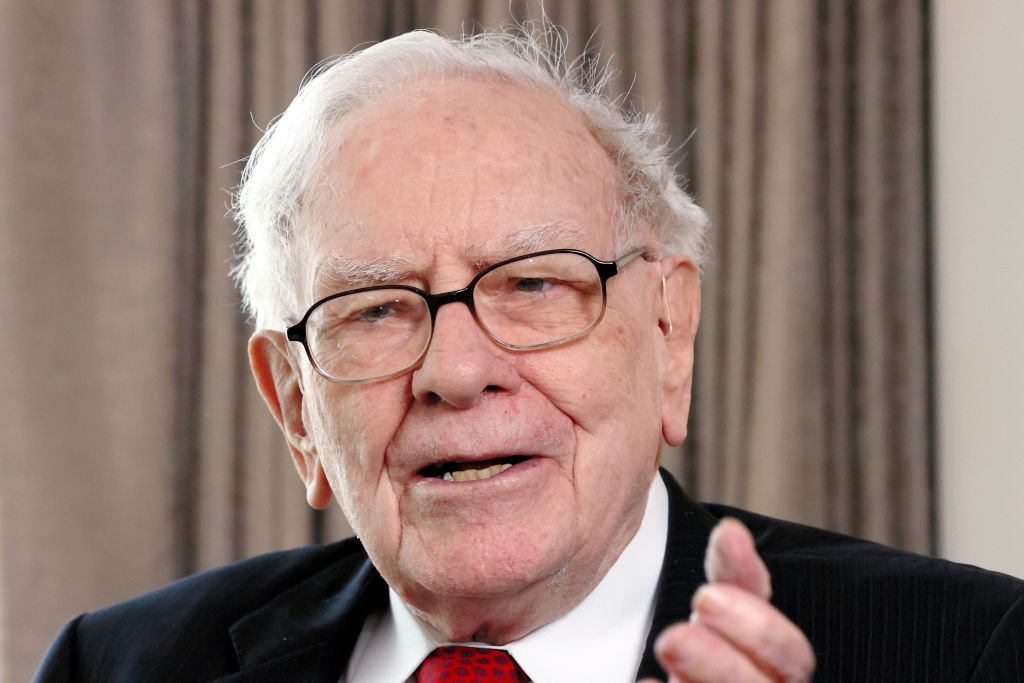With Buffett Retiring, Should You Invest in a Berkshire Copycat?
Warren Buffett will step down at the end of this year. Should you explore one of a handful of Berkshire Hathaway clones or copycat funds?


Profit and prosper with the best of Kiplinger's advice on investing, taxes, retirement, personal finance and much more. Delivered daily. Enter your email in the box and click Sign Me Up.
You are now subscribed
Your newsletter sign-up was successful
Want to add more newsletters?

Delivered daily
Kiplinger Today
Profit and prosper with the best of Kiplinger's advice on investing, taxes, retirement, personal finance and much more delivered daily. Smart money moves start here.

Sent five days a week
Kiplinger A Step Ahead
Get practical help to make better financial decisions in your everyday life, from spending to savings on top deals.

Delivered daily
Kiplinger Closing Bell
Get today's biggest financial and investing headlines delivered to your inbox every day the U.S. stock market is open.

Sent twice a week
Kiplinger Adviser Intel
Financial pros across the country share best practices and fresh tactics to preserve and grow your wealth.

Delivered weekly
Kiplinger Tax Tips
Trim your federal and state tax bills with practical tax-planning and tax-cutting strategies.

Sent twice a week
Kiplinger Retirement Tips
Your twice-a-week guide to planning and enjoying a financially secure and richly rewarding retirement

Sent bimonthly.
Kiplinger Adviser Angle
Insights for advisers, wealth managers and other financial professionals.

Sent twice a week
Kiplinger Investing Weekly
Your twice-a-week roundup of promising stocks, funds, companies and industries you should consider, ones you should avoid, and why.

Sent weekly for six weeks
Kiplinger Invest for Retirement
Your step-by-step six-part series on how to invest for retirement, from devising a successful strategy to exactly which investments to choose.
When a CEO is in his nineties, you'd think investors wouldn't be caught off guard when he says it's time to hang it up. But Mr. Market seems to be displeased by Warren Buffett's announcement in May that he would hand over the reins at Berkshire Hathaway (BRK.B) at the end of 2025. (Buffett, who turned 95 on August 30, will remain as chairman.)
Since that day, Berkshire's "B" shares have fallen 12.6% — even as the broader market notched new highs, with the S&P 500 Index returning 11.8%. (Prices and returns are as of July 31, unless otherwise noted.)
You may be wondering if there's an alternative to a post-Buffett Berkshire. A few Berkshire Hathaway clones are on the market — firms with insurance at their core and portfolios of businesses and stocks built for long-term returns. Some funds either explicitly or implicitly follow the Warren Buffett way.
From just $107.88 $24.99 for Kiplinger Personal Finance
Become a smarter, better informed investor. Subscribe from just $107.88 $24.99, plus get up to 4 Special Issues

Sign up for Kiplinger’s Free Newsletters
Profit and prosper with the best of expert advice on investing, taxes, retirement, personal finance and more - straight to your e-mail.
Profit and prosper with the best of expert advice - straight to your e-mail.
We looked at some of the options below. Fair warning: Replacing Buffett may be as difficult for your portfolio as it is for Berkshire.
Very little of the Berkshire transition was a surprise. Buffett has had stock-picking help for some time from Berkshire execs Ted Weschler and Todd Combs.
And Greg Abel, the man Buffett tapped as the next CEO, was first named a potential successor in January 2018. But Abel built his career as an energy executive, not a portfolio builder.
That seems to have spooked Buffett acolytes, who wonder whether Berkshire's magical long-run returns — a compounded 19.9% from 1965 through 2024 — can continue.
"Buffett is able to take his huge balance sheets and turn $1 into $2," says Vitaliy Katsenelson, a money manager and author of The Intellectual Investor. "I don't know how good Greg Abel is."
That sums up the uncertainty. But Buffett boosters suggest shareholders should remain patient.
Christopher Bloomstran, a St. Louis–based money manager, does not believe the stalled stock price "has anything to do with the likelihood that Greg is not going to do a bang-up job. I think he will. I think he's absolutely phenomenal."
Buffett's Canadian counterpart
Though Abel was born in Alberta, the man widely called "the Canadian Warren Buffett" is 75-year-old Prem Watsa, who founded insurer Fairfax Financial (FRFHF) in 1985 and serves as its chairman and CEO.
The stock trades over the counter in the U.S., and on the Toronto Stock Exchange (FFH), accessible via some brokers, including Fidelity, Interactive Brokers and Schwab. In either case, charges may apply.
With a $39 billion market value, Watsa's company has developed a similar — albeit smaller — following to Berkshire's. The Fairfax annual meeting is a multiday affair that attracts value-oriented investors from Canada and other countries.
A fan blog, the Corner of Berkshire & Fairfax, is dedicated to value investing forums and discussion of the similarities between the two companies.
Fairfax's results suggest why: The company's book value per share increased an average 18.7% per year from 1985 to 2024, while the share price increased at an annualized rate of 19.2%.
Watsa may be even more of a bargain hunter than Berkshire, and that has occasionally led to picking losers. Fairfax's portfolio has muddled along for years with a large position in BlackBerry (BB), the mobile-phone pioneer that has struggled to reinvent itself.
Fairfax has had some winners recently, though. A large position in Canadian steelmaker Stelco paid off handsomely when Cleveland-Cliffs (CLF) bought the company in 2024. Fairfax's one-third stake in Greece's Eurobank increased in value from $2.3 billion at the end of 2023 to $3.2 billion on March 31.
Stephen Boland, an analyst at brokerage Raymond James, says Fairfax is one of the most diversified insurers, both in the number of countries in which it operates and in the lines of insurance it sells.
The company is "still exposed to California wildfires — it took a big loss for that in 2024 — but it has tended to diversify the business really, really well on the insurance side," says Boland, who recommends the shares.
With what he believes was a "stellar" second quarter for the company's investment portfolio, the stock is his top pick in the Canadian insurance sector. It trades at about 10 times earnings for the year ahead, according to S&P Global Market Intelligence.
Berkshire Hathaway's insurance operations largely target consumers — its Geico subsidiary causes some analysts to categorize Berkshire as an auto insurer.
Markel (MKL), by contrast, is a "specialty insurer," with sophisticated customers. It sells products such as collectible-car insurance, liability policies for corporate boards of directors, and insurance against damage to offshore oil rigs.
Like Fairfax, Markel has encouraged comparisons to Berkshire. For 35 years, the company, headquartered in Virginia, has held a brunch in Omaha on the weekend of the big Buffett bash. More than 2,500 people reportedly attended the 2025 event.
Over the past 38 years, the company's share price has increased at an annualized rate of roughly 15%.
Berkshire stock is the single largest holding in Markel's portfolio, accounting for $1.7 billion worth of assets on March 31 — three times the size of the second-largest position. Alphabet (GOOGL), Brookfield (BN), Deere (DE) and Amazon.com (AMZN) round out the top five, with each position worth about $400 million to $500 million.
Markel's portfolio of stocks, like Berkshire's, accounts for a heavier proportion of assets than for most insurers, which tend to focus on bonds. A separate division, Markel Ventures, holds 100% ownership in 20 companies, many of which are manufacturers.
Analysts say they like Markel in the long run, but a recent spike in the shares, coupled with underwhelming insurance results, has cooled them on its near-term performance.
Activist investor Jana Partners disclosed in December 2024 it had taken a stake in Markel and wanted the company to spin off its ventures unit so that it would be a more attractive takeover target for a conventional insurer.
The Jana news boosted Markel's stock price, and it trades at about 20 times earnings for the year ahead, according to S&P. Just one of seven analysts who cover Markel rate it a Buy.
Given depressed profits, "I think they're trading kind of where they should be now," says analyst Robert Farnam, of investment firm Janney, who has a Hold rating on the shares.
But the stock may have appeal for investors who buy on dips or who have a long enough time horizon. "I consider Markel to be a terrific long-term investment," says Farnam. "This is the type of stock that you basically put into retirement accounts and forget about."
Loews (L) has an insurance company at its core and owns multiple businesses, including hotels and an energy pipeline company, so it, too, has drawn comparisons to Berkshire. But in many ways, Loews is more of a family conglomerate.
Benjamin Tisch, named CEO this year, is the third generation of his family to run the company, a component of the S&P 500, and members of the Tisch family own roughly 20% of the stock.
"Even though Loews is in the 500, there's low investor interest" because of the Tisches' outsize stake, says Catherine Seifert, an analyst with CFRA who stopped covering the company more than two years ago. "And they're not as diversified as Berkshire anyway. Honestly, if you want to replicate Berkshire, you're probably better off doing it with a series of exchange-traded funds."
Following Buffett's path
There are a handful of ETFs that explicitly follow Berkshire; but with the Buffett premium seemingly dissipating at Berkshire, you might be better off looking for other funds that incorporate Buffett-esque investing principles, such those focused on companies that enjoy wide "moats," says Aniket Ullal, head of ETF research and analytics at CFRA.
When Buffett explains his desire to invest in businesses with a long-term competitive advantage, he has long used the word moat, as in a waterway that surrounded castles of the Middle Ages.
A moat keeps potential competitors away from your business — in economic terms, it's called a barrier to entry. Berkshire's wholly owned subsidiary BNSF Railway, for example, has a moat: Only four major railroad companies remain in the U.S., and the probability that a new one will try to lay thousands of miles of track to compete is nearly zero.
The largest and oldest moat ETF is the VanEck Morningstar Wide Moat ETF (MOAT), which tracks the Morningstar Wide Moat Focus Index. The 52 companies in the index as of May 31 were the cheapest of what Morningstar considers wide-moat stocks, based on their discount to the research firm's estimate of their fair value.
The ETF's top three holdings at last report were Estée Lauder (EL), military shipbuilder Huntington Ingalls Industries (HII) and Allegion (ALLE), an industrial security firm.
Compared with similar funds, the portfolio is overweight in health care and consumer staples stocks and has less invested in consumer discretionary and financial services names, according to Morningstar.
In a market that has seen years of exuberance for high-growth names, however, the fund's philosophy has had a mixed track record. It returned 7.5% over the past 12 months, compared with 16.3% for the S&P 500.
Four times in the past decade, it has been in the top 6% of its fund category (U.S. large-company stocks with a blend of growth and value characteristics). But it had a poor 2024, ranking in the bottom 5%. The fund's expense ratio is 0.47%.
Another approach is to zero in on funds that focus on metrics that typically point to the kind of high-quality companies that Buffett favors.
We prefer the JPMorgan U.S. Quality Factor ETF (JQUA), a member of the Kiplinger ETF 20, the list of our favorite exchange-traded funds. The fund tracks an index that sifts for companies that meet 10 criteria, including measures of profitability such as strong earnings and cash flow; financial risk (low debt, high interest coverage, low share-price volatility); and earnings quality (consistent accounting practices).
It has returned 13.6% over the past 12 months, and its 0.12% expense ratio makes it one of the cheapest funds of its kind. Top sectors are technology, financial services and consumer discretionary stocks. Nvidia (NVDA) was the fund's top holding at last report. Berkshire Hathaway places in the fund's top 10.
Then again, perhaps you should follow Buffett's own investment advice for individual investors. In 1994, he told shareholders that by "periodically investing in an index fund, a know-nothing investor can actually outperform most investment professionals."
At Berkshire's 2020 annual meeting, he elaborated: "In my view, for most people, the best thing to do is to own the S&P 500 index fund. People will try to sell you other things because there's more money in it if they do." He has specifically suggested the low-cost Vanguard S&P 500 ETF (VOO), with an expense ratio of 0.03%.
Note: This item first appeared in Kiplinger Personal Finance Magazine, a monthly, trustworthy source of advice and guidance. Subscribe to help you make more money and keep more of the money you make here.
Related content
- Warren Buffett Stocks: The Berkshire Hathaway Portfolio
- What Set Warren Buffett Apart
- What Would a $1,000 Investment in Berkshire Stock Be Worth Today?
Profit and prosper with the best of Kiplinger's advice on investing, taxes, retirement, personal finance and much more. Delivered daily. Enter your email in the box and click Sign Me Up.

David Milstead joined Kiplinger Personal Finance as senior associate editor in May 2025 after 15 years writing for Canada's Globe and Mail. He's been a business journalist since 1994 and previously worked at the Rocky Mountain News in Denver, the Wall Street Journal, and at publications in Ohio and his native South Carolina. He's a graduate of Oberlin College.
-
 Over 65? Here's What the New $6K 'Senior Deduction' Means for Medicare IRMAA Costs
Over 65? Here's What the New $6K 'Senior Deduction' Means for Medicare IRMAA CostsTax Breaks A new deduction for people over age 65 has some thinking about Medicare premiums and MAGI strategy.
-
 U.S. Congress to End Emergency Tax Bill Over $6,000 Senior Deduction and Tip, Overtime Tax Breaks in D.C.
U.S. Congress to End Emergency Tax Bill Over $6,000 Senior Deduction and Tip, Overtime Tax Breaks in D.C.Tax Law Here's how taxpayers can amend their already-filed income tax returns amid a potentially looming legal battle on Capitol Hill.
-
 5 Investing Rules You Can Steal From Millennials
5 Investing Rules You Can Steal From MillennialsMillennials are reshaping the investing landscape. See how the tech-savvy generation is approaching capital markets – and the strategies you can take from them.
-
 5 Investing Rules You Can Steal From Millennials
5 Investing Rules You Can Steal From MillennialsMillennials are reshaping the investing landscape. See how the tech-savvy generation is approaching capital markets – and the strategies you can take from them.
-
 When Estate Plans Don't Include Tax Plans, All Bets Are Off: 2 Financial Advisers Explain Why
When Estate Plans Don't Include Tax Plans, All Bets Are Off: 2 Financial Advisers Explain WhyEstate plans aren't as effective as they can be if tax plans are considered separately. Here's what you stand to gain when the two strategies are aligned.
-
 Counting on Real Estate to Fund Your Retirement? Avoid These 3 Costly Mistakes
Counting on Real Estate to Fund Your Retirement? Avoid These 3 Costly MistakesThe keys to successful real estate planning for retirees: Stop thinking of property income as a reliable paycheck, start planning for tax consequences and structure your assets early to maintain flexibility.
-
 I'm a Financial Planner: These Small Money Habits Stick (and Now Is the Perfect Time to Adopt Them)
I'm a Financial Planner: These Small Money Habits Stick (and Now Is the Perfect Time to Adopt Them)February gets a bad rap for being the month when resolutions fade — in fact, it's the perfect time to reset and focus on small changes that actually pay off.
-
 Nasdaq Leads a Rocky Risk-On Rally: Stock Market Today
Nasdaq Leads a Rocky Risk-On Rally: Stock Market TodayAnother worrying bout of late-session weakness couldn't take down the main equity indexes on Wednesday.
-
 5 Top Tax-Efficient Mutual Funds for Smarter Investing
5 Top Tax-Efficient Mutual Funds for Smarter InvestingMutual funds are many things, but "tax-friendly" usually isn't one of them. These are the exceptions.
-
 Why Invest In Mutual Funds When ETFs Exist?
Why Invest In Mutual Funds When ETFs Exist?Exchange-traded funds are cheaper, more tax-efficient and more flexible. But don't put mutual funds out to pasture quite yet.
-
 Social Security Break-Even Math Is Helpful, But Don't Let It Dictate When You'll File
Social Security Break-Even Math Is Helpful, But Don't Let It Dictate When You'll FileYour Social Security break-even age tells you how long you'd need to live for delaying to pay off, but shouldn't be the sole basis for deciding when to claim.